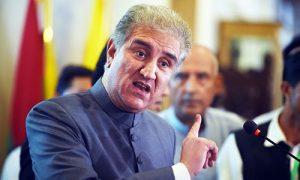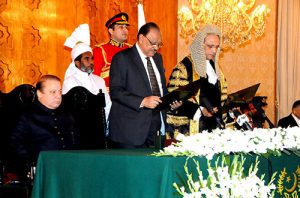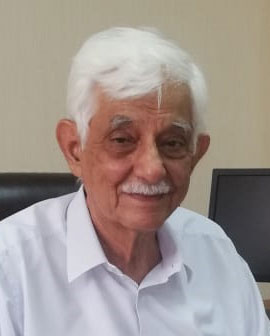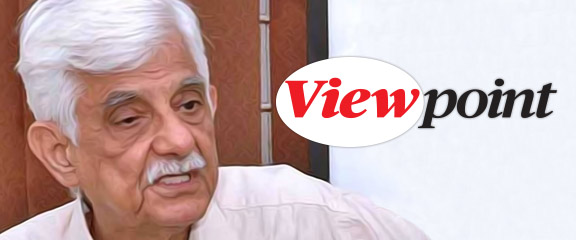The Jadhav Bill presented by Law Minister Farogh Nasim and hurriedly passed by the National Assembly gave a message to the international community that Superior Courts in Pakistan did not have the jurisdiction to effectively review and reconsider sentences given by military courts.
The learned MQM Minister is certainly aware of the fact that Commander Kulbhushan Jadhav’s case is already in the High Court. He certainly knows of the many cases in which High Courts have provided relief to those sentenced by military courts, especially the case where the Peshawar High Court had acquitted 72 convicts of a military court in 2018. Why then was fresh legislation required ‘empowering’ High Courts to review and reconsider sentences given by a military court?
In his speech at the National Assembly, the MQM minister said that the International Court of Justice (ICJ) had ordered fresh legislation, and the matter would go to the UN Security Council if we did not pass it. However, such orders of the ICJ have not been quoted in the aims and objects of the Bill. Instead, an excerpt from paragraph 147 of the ICJ judgment has been cleverly quoted which is as under:
“Pakistan is under an obligation to provide, by means of its own choosing, effective review and reconsideration of the sentence of Mr. Jadhav.”
“Appropriate legislation, if necessary” has been mentioned only once in the ICJ Judgment, in its paragraph 146. It is not possible that the learned MQM minister jumped to the next paragraph, 147, without reading Paragraph 146 of the ICJ judgment. Paragraph 146 runs as under:
“Pakistan shall take all measures to provide for effective review and reconsideration including, if necessary, by enacting appropriate legislation.”
The learned MQM minister knew very well that fresh legislation was not necessary since effective review and reconsideration had already been provided for. By design, he chose not to mention paragraph 146 in the aims and objectives of the Bill since the paragraph contained the qualifying words ‘if necessary.’
Pakistan’s Attorney General at that time, Mr. Anwar Mansoor Khan, while pleading the case before the ICJ had assured the Court that ‘free and fair trial’ was a fundamental right under our Constitution and Cdr. Jadhav had the right to go to the High Court and the Supreme Court under our laws. Even the military court that had provided a lawyer to Cdr. Jadhav had explained in its judgment the various routes of appeal that were available to Cdr. Jadhav.
The right wing governments of Mian Nawaz Sharif and Imran Khan have mishandled the ICJ case from the beginning. There were two cases against the Indian Navy Commander. The first one was that of espionage and the other one was that of terrorism. The terrorism case, for unknown reasons, has not proceeded under either government. Persons accused of terrorism cannot avail the facility of consular access. Any appeal against a terrorist is inadmissible in the ICJ. Our lawyers in the case limited themselves to the espionage charge. They relied on the bilateral agreement of 2008 on consular access between India and Pakistan. The ICJ took up the matter under Article 36 of the Vienna Convention and also held that the bilateral agreement of 2008 provided for consular access to those charged with espionage.
A very closely held secret in the matter is that Imran Khan’s foreign office offered to repatriate Cdr. Jadhav if India gave the undertaking that he would be tried in Indian courts. Modi perhaps desired that the officer be pronounced ‘not guilty’ by our courts and not theirs. And perhaps he has the confidence that our lawyers will once again mess up the case before our courts.

ICJ judge Mr. Justice Tassaduq Jillani gave a dissenting judgment, in which he called Commander Jadhav a terrorist and gave the opinion that the appeal made by India was inadmissible. He warned that the ICJ Judgment had set a “dangerous precedent when states are already confronted with transnational terrorist activities.” Again, for unknown reasons, the governments of both Mian Sahib and Imran Khan have totally ignored the dissenting judgment of Mr. Justice Jillani. I prefer to own it, not because Justice Jillani is a Pakistani, but because the arguments given by him in his dissenting judgment are solid arguments.

I do not doubt the capabilities of the MQM minister as a lawyer of repute. But I certainly doubt his and his government’s intentions.
After his arrest on March 3, 2016, and by his own admission that he was a senior officer of the Indian Navy, Cdr. Jadhav was treated with all the courtesy that is given to officers of his rank, by the Pakistani authorities. He gave the details of his mission in a confessional statement before a magistrate.
In his confessional statement, Cdr. Jadhav said that he had been instructed by his government to commit serious acts of terrorism and espionage and that he had 15 other accomplices who were working with him, that he had planned and executed acts of terror causing loss of life and property in Balochistan and Karachi. While it is logical that officers of his rank would not be acting in isolation, one does not know if the 15 accomplices that he has confessed to were apprehended or not. It is most likely that after the Commander’s arrest the accomplices made good their escape. One also does not know as yet whether the terrorist attack at the Karachi Stock Exchange foiled by the brave security personnel was planned by him or not. However, his confessional statement gives a very clear picture of Indian plans to carry out acts of terrorism on Pakistani soil. It is not understood why the case of terrorism against Cdr. Jadhav has not proceeded as yet in Pakistani courts, nor was the charge of terrorism forcefully pursued before the ICJ.
The Indian government claimed that Cdr. Jadhav was running a small business in Chah Bahar, Iran, from where he was kidnapped by Pakistan. It is surprising to note that a serving Commander of the Indian Navy was running a private business in another country. Also, it is not understood why the Indian government did not take up the issue with the Iranian government if their officer or any citizen had really been kidnapped while on Iranian soil.
Our foreign office wishfully or perhaps stupidly kept requesting the Indian government for their assistance in the case against Cdr. Jadhav. The Indian government kept insisting that consular access should be provided to their man. Time kept passing till after Mr. Jadhav’s conviction by a Field Court Martial, the Indian government approached the ICJ with an appeal to order Pakistan to stop his execution and to provide consular access to him. Ultimately, with a 15:1 vote the ICJ ordered Pakistan to provide consular access, which was done in the end. Meetings with Cdr. Jadhav’s wife and mother were also arranged by Pakistani authorities in Islamabad.

Mr. Justice Gilani, in his dissenting judgment, has held the Indian appeal inadmissible and an abuse of rights given under the Vienna Convention. He has held that terrorism had become a systematic weapon of war and the majority judgment shall form a dangerous precedent at a time when states are already confronted with transnational terrorist activities. The learned Judge also mentioned in his dissenting judgment that Pakistan already had in place the procedures necessary for ensuring the effective review and reconsideration of the conviction.
Why then we are so shy to own what Mr. Justice Gilani has pointed out? Why is there a necessity of passing a fresh law when the ICJ has already used the words “if necessary” in the context of fresh legislation in their judgment and the procedures necessary for ensuring effective review and reconsideration of the conviction not only are in place but are also being availed of by Cdr. Jadhav? Why are we being threatened with the possibility of India going to the UN Security Council when the ICJ orders have already been complied with? Why do we think that countries having veto powers in the UN Security Council will allow promotion of terrorism and secessionism? Why don’t we know that China — which is crushing terrorism and secessionism on its own soil, and in Central Asia — will not allow the UN Security Council to set up a dangerous precedent? Have we done anything to take other powers on board and informed them that we have already complied with the ICJ orders? What difference does the fresh law make in the ground situation of the Cdr. Jadhav case, which is already in the Islamabad High Court?
There must be a purpose behind the drafting of the fresh law and getting it passed in a rush. There must be some politics behind the admonition by the MQM minister of the NA members that they should first read the ICJ judgment and then speak on the Bill. Well, there are some who have read the judgment and who have risked their lives fighting the ‘break Pakistan’ ideology of the MQM founder. Those, who in the most tragic of circumstances still raise the slogan of ‘Pakistan Khapay.’

The writer is a Senator and a founding member of the Pakistan Peoples’ Party.



